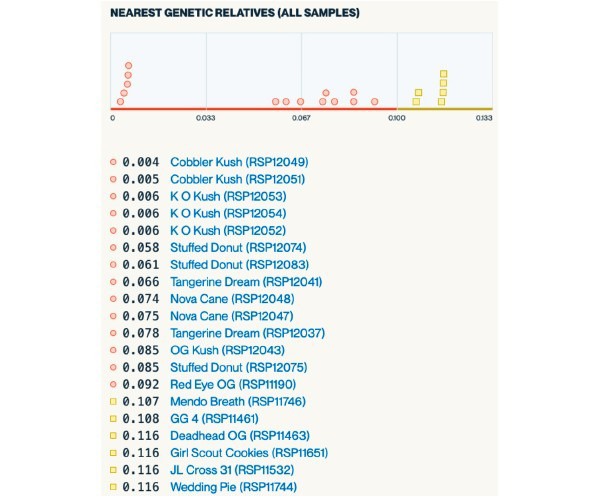The cannabis industry has already witnessed several instances of IP litigation, with one of the most notable cases involving the renowned candy brand Skittles and a cannabis brand with a similar name. However, when it comes to plants, while identifying IP theft in brand names is relatively straightforward, it becomes more complex when cannabis varieties are involved.
Medicinal Genomics, a company that offers genetics-based cannabis testing solutions, cracked a case involving a grower illegally cultivating varieties owned by another company. But before reaching this successful conclusion, a lot of time had passed before Medicinal Genomics was brought in.
How it all began
The company that owned these cannabis genetics, which we'll refer to as Company A for anonymity, is a cultivator-owned, small-batch craft cannabis grower founded in 2011. The company has historically produced highly successful strains, winning over 31 awards for its cannabis flowers and concentrates. They entered into an agreement with a California-based company, which we'll call Company X, to grow Company A's proprietary genetics and sell flowers and concentrates under their brand names.
It took years to design the cultivation space, but eventually, Company A's founder and president filled it with 22 of their proprietary strains, totaling over 500 plants. Everything proceeded smoothly for months, with Company A's president managing the cultivation, until just a few weeks before harvest. At that point, they were abruptly informed that they were no longer welcome on the premises and were barred from entering the facility. Company X then harvested the plants and sold them under its own brand.
IP theft
A lawsuit inevitably followed. Despite a cease and desist order, Company X continued to grow and sell products using Company A's proprietary genetics. In fact, Company X's METRC records showed that they had merely renamed the plants. "From all their METRC reports, I could see they were still cultivating the exact same genetics," Company A's president recalled. "And they were foolish enough to rename all my original trade names in the system to new ones. There was a clear track record visible in METRC."
However, this evidence was not sufficient for the judge to take further action, and Company X was audacious enough to challenge Company A to pursue legal action. That's when a friend suggested that Company A's president use DNA genotyping to prove that Company X's products were derived from Company A's genetics. They hired a private investigator to purchase samples of both Company A's and Company X's products from a dispensary that carried both brands. These samples were then sent to a cannabis testing lab to purify the DNA and subsequently forwarded to Medicinal Genomics for genotyping.
Cracking the case
Medicinal Genomics analyzed the samples and provided unique genomic information on over 80,000 single nucleotide polymorphisms across the cannabis genome for each sample. A genomics expert from California State University reviewed the data and concluded that several of Company X's products were genetically identical to Company A's strains. For instance, Company X's "K O Kush" was found to be more than 99% similar to Company A's "Cobbler Kush."

Since reaching a settlement, Company A has made sequencing and genotyping their genetics a standard part of their operations. Before any new strains enter production, they are sequenced to establish a genomic baseline, protecting the company if their strains end up in unauthorized hands. "Having that protection and baseline is very reassuring," said Company A's president. "If we face another lawsuit, I'll be confident walking into it." They advise other breeders to adopt similar procedures to safeguard their work. "If you're entering a contract to share your genetics, get them DNA sequenced. Protect yourself and hold others accountable."
For more information:
Medicinal Genomics
[email protected]
medicinalgenomics.com
